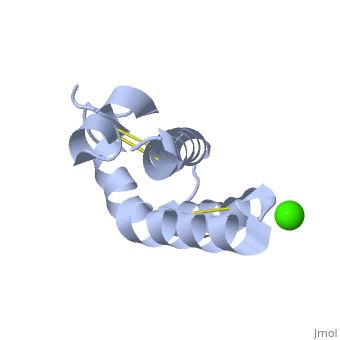We apologize for Proteopedia being slow to respond. For the past two years, a new implementation of Proteopedia has been being built. Soon, it will replace this 18-year old system. All existing content will be moved to the new system at a date that will be announced here.
2dob
From Proteopedia
(Difference between revisions)
| Line 3: | Line 3: | ||
== Structural highlights == | == Structural highlights == | ||
<table><tr><td colspan='2'>[[2dob]] is a 1 chain structure with sequence from [http://en.wikipedia.org/wiki/Homo_sapiens Homo sapiens]. Full crystallographic information is available from [http://oca.weizmann.ac.il/oca-bin/ocashort?id=2DOB OCA]. For a <b>guided tour on the structure components</b> use [http://oca.weizmann.ac.il/oca-docs/fgij/fg.htm?mol=2DOB FirstGlance]. <br> | <table><tr><td colspan='2'>[[2dob]] is a 1 chain structure with sequence from [http://en.wikipedia.org/wiki/Homo_sapiens Homo sapiens]. Full crystallographic information is available from [http://oca.weizmann.ac.il/oca-bin/ocashort?id=2DOB OCA]. For a <b>guided tour on the structure components</b> use [http://oca.weizmann.ac.il/oca-docs/fgij/fg.htm?mol=2DOB FirstGlance]. <br> | ||
| - | </td></tr><tr><td class="sblockLbl"><b>[[Ligand|Ligands:]]</b></td><td class="sblockDat"><scene name='pdbligand=CA:CALCIUM+ION'>CA</scene>< | + | </td></tr><tr id='ligand'><td class="sblockLbl"><b>[[Ligand|Ligands:]]</b></td><td class="sblockDat"><scene name='pdbligand=CA:CALCIUM+ION'>CA</scene></td></tr> |
| - | <tr><td class="sblockLbl"><b>[[Non-Standard_Residue|NonStd Res:]]</b></td><td class="sblockDat"><scene name='pdbligand=MSE:SELENOMETHIONINE'>MSE</scene></td></tr> | + | <tr id='NonStdRes'><td class="sblockLbl"><b>[[Non-Standard_Residue|NonStd Res:]]</b></td><td class="sblockDat"><scene name='pdbligand=MSE:SELENOMETHIONINE'>MSE</scene></td></tr> |
| - | <tr><td class="sblockLbl"><b>[[Related_structure|Related:]]</b></td><td class="sblockDat">[[1n69|1n69]], [[1m12|1m12]], [[2gtg|2gtg]]</td></tr> | + | <tr id='related'><td class="sblockLbl"><b>[[Related_structure|Related:]]</b></td><td class="sblockDat">[[1n69|1n69]], [[1m12|1m12]], [[2gtg|2gtg]]</td></tr> |
| - | <tr><td class="sblockLbl"><b>[[Gene|Gene:]]</b></td><td class="sblockDat">PSAP ([http://www.ncbi.nlm.nih.gov/Taxonomy/Browser/wwwtax.cgi?mode=Info&srchmode=5&id=9606 Homo sapiens])</td></tr> | + | <tr id='gene'><td class="sblockLbl"><b>[[Gene|Gene:]]</b></td><td class="sblockDat">PSAP ([http://www.ncbi.nlm.nih.gov/Taxonomy/Browser/wwwtax.cgi?mode=Info&srchmode=5&id=9606 Homo sapiens])</td></tr> |
| - | <tr><td class="sblockLbl"><b>Resources:</b></td><td class="sblockDat"><span class='plainlinks'>[http://oca.weizmann.ac.il/oca-docs/fgij/fg.htm?mol=2dob FirstGlance], [http://oca.weizmann.ac.il/oca-bin/ocaids?id=2dob OCA], [http://www.rcsb.org/pdb/explore.do?structureId=2dob RCSB], [http://www.ebi.ac.uk/pdbsum/2dob PDBsum]</span></td></tr> | + | <tr id='resources'><td class="sblockLbl"><b>Resources:</b></td><td class="sblockDat"><span class='plainlinks'>[http://oca.weizmann.ac.il/oca-docs/fgij/fg.htm?mol=2dob FirstGlance], [http://oca.weizmann.ac.il/oca-bin/ocaids?id=2dob OCA], [http://www.rcsb.org/pdb/explore.do?structureId=2dob RCSB], [http://www.ebi.ac.uk/pdbsum/2dob PDBsum]</span></td></tr> |
| - | <table> | + | </table> |
== Disease == | == Disease == | ||
[[http://www.uniprot.org/uniprot/SAP_HUMAN SAP_HUMAN]] Defects in PSAP are the cause of combined saposin deficiency (CSAPD) [MIM:[http://omim.org/entry/611721 611721]]; also known as prosaposin deficiency. CSAPD is due to absence of all saposins, leading to a fatal storage disorder with hepatosplenomegaly and severe neurological involvement.<ref>PMID:1371116</ref> <ref>PMID:11309366</ref> Defects in PSAP saposin-B region are the cause of leukodystrophy metachromatic due to saposin-B deficiency (MLD-SAPB) [MIM:[http://omim.org/entry/249900 249900]]. MLD-SAPB is an atypical form of metachromatic leukodystrophy. It is characterized by tissue accumulation of cerebroside-3-sulfate, demyelination, periventricular white matter abnormalities, peripheral neuropathy. Additional neurological features include dysarthria, ataxic gait, psychomotr regression, seizures, cognitive decline and spastic quadriparesis. Defects in PSAP saposin-C region are the cause of atypical Gaucher disease (AGD) [MIM:[http://omim.org/entry/610539 610539]]. Affected individuals have marked glucosylceramide accumulation in the spleen without having a deficiency of glucosylceramide-beta glucosidase characteristic of classic Gaucher disease, a lysosomal storage disorder.<ref>PMID:2060627</ref> <ref>PMID:17919309</ref> Defects in PSAP saposin-A region are the cause of atypical Krabbe disease (AKRD) [MIM:[http://omim.org/entry/611722 611722]]. AKRD is a disorder of galactosylceramide metabolism. AKRD features include progressive encephalopathy and abnormal myelination in the cerebral white matter resembling Krabbe disease.<ref>PMID:15773042</ref> Note=Defects in PSAP saposin-D region are found in a variant of Tay-Sachs disease (GM2-gangliosidosis). | [[http://www.uniprot.org/uniprot/SAP_HUMAN SAP_HUMAN]] Defects in PSAP are the cause of combined saposin deficiency (CSAPD) [MIM:[http://omim.org/entry/611721 611721]]; also known as prosaposin deficiency. CSAPD is due to absence of all saposins, leading to a fatal storage disorder with hepatosplenomegaly and severe neurological involvement.<ref>PMID:1371116</ref> <ref>PMID:11309366</ref> Defects in PSAP saposin-B region are the cause of leukodystrophy metachromatic due to saposin-B deficiency (MLD-SAPB) [MIM:[http://omim.org/entry/249900 249900]]. MLD-SAPB is an atypical form of metachromatic leukodystrophy. It is characterized by tissue accumulation of cerebroside-3-sulfate, demyelination, periventricular white matter abnormalities, peripheral neuropathy. Additional neurological features include dysarthria, ataxic gait, psychomotr regression, seizures, cognitive decline and spastic quadriparesis. Defects in PSAP saposin-C region are the cause of atypical Gaucher disease (AGD) [MIM:[http://omim.org/entry/610539 610539]]. Affected individuals have marked glucosylceramide accumulation in the spleen without having a deficiency of glucosylceramide-beta glucosidase characteristic of classic Gaucher disease, a lysosomal storage disorder.<ref>PMID:2060627</ref> <ref>PMID:17919309</ref> Defects in PSAP saposin-A region are the cause of atypical Krabbe disease (AKRD) [MIM:[http://omim.org/entry/611722 611722]]. AKRD is a disorder of galactosylceramide metabolism. AKRD features include progressive encephalopathy and abnormal myelination in the cerebral white matter resembling Krabbe disease.<ref>PMID:15773042</ref> Note=Defects in PSAP saposin-D region are found in a variant of Tay-Sachs disease (GM2-gangliosidosis). | ||
| Line 39: | Line 39: | ||
</StructureSection> | </StructureSection> | ||
[[Category: Homo sapiens]] | [[Category: Homo sapiens]] | ||
| - | [[Category: Ahn, V E | + | [[Category: Ahn, V E]] |
| - | [[Category: Prive, G G | + | [[Category: Prive, G G]] |
[[Category: Lipid binding protein]] | [[Category: Lipid binding protein]] | ||
[[Category: Lipid-binding protein]] | [[Category: Lipid-binding protein]] | ||
[[Category: Saposin]] | [[Category: Saposin]] | ||
[[Category: Sphingolipid activator protein]] | [[Category: Sphingolipid activator protein]] | ||
Revision as of 16:08, 15 January 2015
Crystal Structure of Human Saposin A
| |||||||||||


